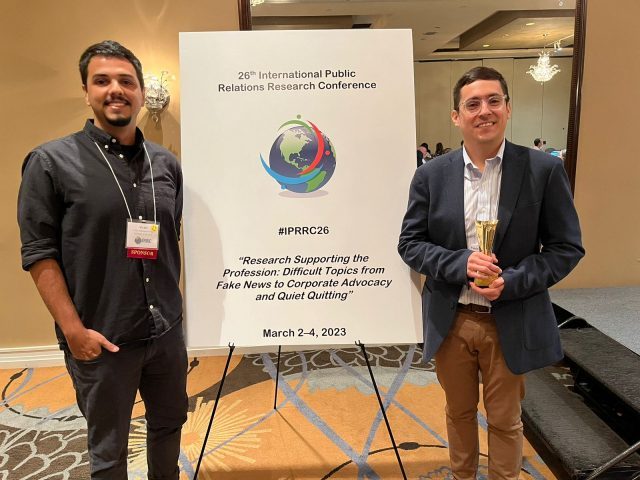Study on brand perceptions of Latin American nations wins the International Aberje Award

The 15th edition of the International Aberje Award was granted on March 4 during the International Conference of Public Relations Researchers (IPRRC) in Orlando, United States. The event rewards foreign researchers’ academic studies related to communication and public relations in Brazil and Latin America.
This year, authors Pablo Miño, from Boston University, and Joseph Czabovsky, from the University of North Carolina at Chapel Hill, won with the paper called “Applying the Typology of Disinformation-Susceptible Publics to Nation Branding: Perceptions of Latin American Countries Shaped by Americans’ Views on Immigration Issues.”
The study, which was presented by author Miño, an Assistant Professor at the College of Communication at the University of Boston, aims to contribute to the application of the concept of nation branding by raising data on the perceptions of Americans about eight Latin American countries – Argentina, Brazil, Chile, Colombia, Costa Rica, Dominican Republic, Mexico, and Peru. His study also considered an analysis of perceptions of immigration issues of these populations.
The hypothesis raised by the researchers considers that Americans with insufficient knowledge about these countries have negative attitudes and motivations regarding immigration issues, in general, and a low level of recognition of the branding of these nations. Some examples of a goal of a nation branding work is the public’s correlation with countries’ export products, its stereotypes, and tourism. It aims to contribute to the work these countries conduct, considering that the US is one of the largest consumers of their products.
The study is still in progress, but some preliminary findings show that Latin American countries have a moderate perception among the American public, with Mexico being the most perceived. The perception increases among those who have visited the countries surveyed, with Costa Rica being the most perceived and Colombia being the least perceived. For the authors, the fact that a person has known the country increases their perception and knowledge about the nation, but it is not necessarily positive or profound.
The research showed that all countries were described and perceived as “beautiful places” with a “rich history” and “distinct culture” without, however, considering political or economic issues. This vision, however, can be solved with good nation branding work.
The researchers intend to expand their studies by aggregating more countries and analyzing different concepts related to the image and branding of nations. In addition, the project also aims to increase the literature on communication and public relations of the US academy focused on the study of Latin America, which, according to the authors, has been neglected.
The International Aberje Award included a US$1,000.00 grant and a trophy similar to the Aberje Awards. This year, the award and international partnership with IPRRC celebrated its 15th anniversary.
International Aberje Award
Since 2009, Aberje has recognized and awarded academic studies by foreign researchers related to communication and public relations in Brazil and Latin America, granting them the International Aberje Award. The award is given during the International Public Relations Research Conference (IPRRC) in the USA. The selection process for the award-winning research has the IPRRC Board of Directors evaluation, composed of academics from different parts of the world.
Destaques
- Theme of the Year “Communication for Transition” Renewed for 2025
- Web Summit Lisbon 2024: Innovation and Ethics in a Future Shaped by AI
- Global Alliance Launches Recognition Program for Young Communicators
- Alejandro Cornejo Montibeller Joins the Latin American Regional Council of the Global Alliance
- LiderCom Meeting Discusses International Expectations for COP30



























